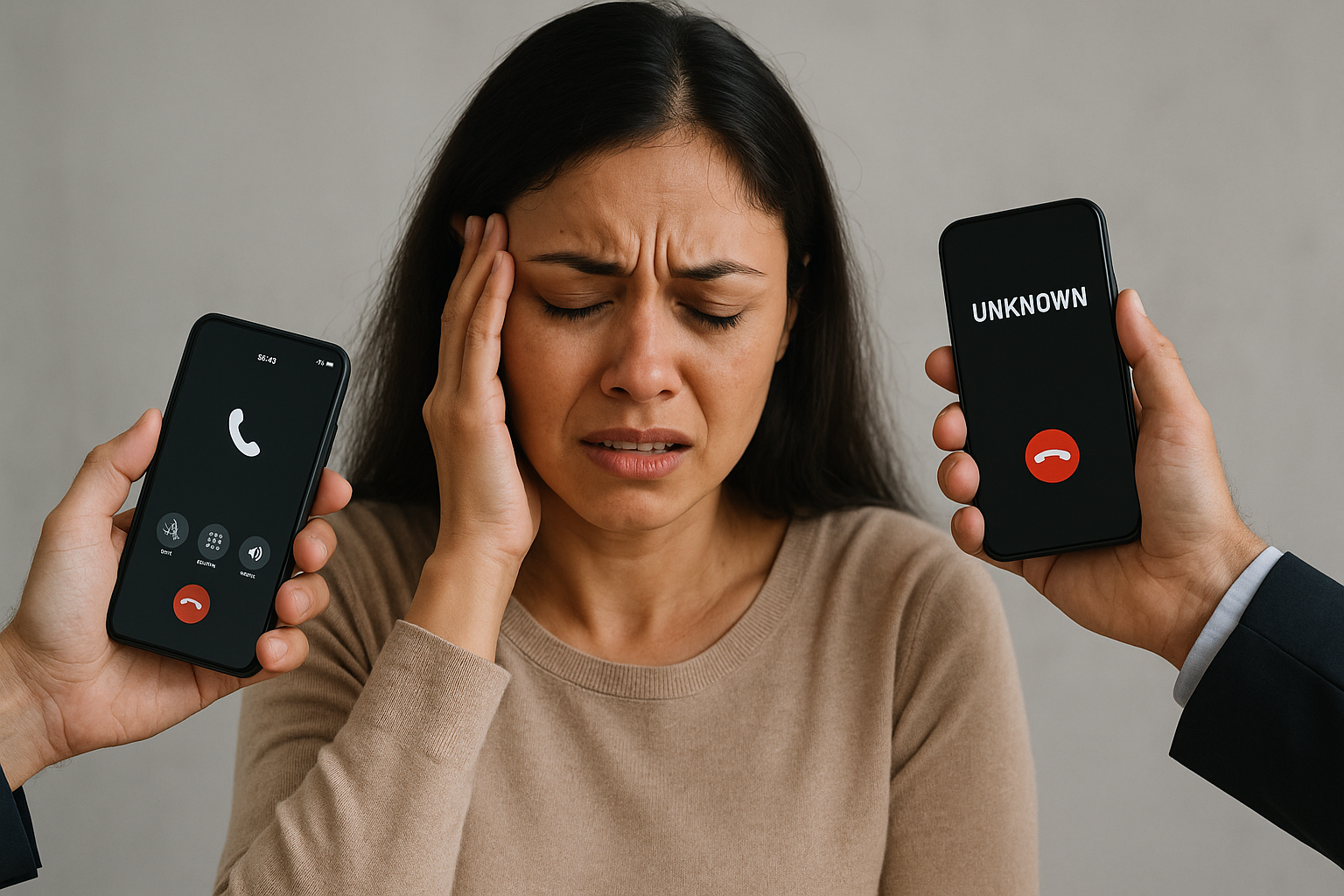Calling Someone Over and Over Again
Calling Someone Over and Over Again
In today’s digital world, the ancient science of Vedic astrology meets technology through tools like online marriage astrology calculators, offering clarity and cosmic predictions with just your date, time, and place of birth. But the real depth of prediction lies far beyond a calculator’s numerical result — it’s in the hands of a skilled astrologer who interprets your chart with intuition, scriptural wisdom, and cosmic observation. That’s where Nayku’s astrology services shine — providing precise, confidential, and personalized online marriage prediction sessions rooted in Vedic knowledge yet adapted for the modern digital seeker. This is not just about “when,” but why and how your marriage will unfold the way it does. Let’s uncover that cosmic mystery step by step.
What begins as an innocent phone call can turn into a nightmare when it is done over and over again, especially after a person has said “No.” The boundaries of personal space extend into digital communication, and repeated calls—especially without consent—are increasingly viewed as a form of harassment or stalking.
Nayku Legal Services helps individuals across the world deal with phone-based harassment by offering expert legal counsel, complaint drafting, and emotional support, all through a secure online platform.
When Does Calling Become Harassment?
Not every call is harassment. But it becomes one when:
- Calls are frequent and unsolicited
- You’ve explicitly asked the person to stop
- The caller uses different numbers to bypass blocks
- You feel anxious, scared, or emotionally drained
- The calls continue late at night or during work hours
If you’ve experienced these signs, Nayku Legal Services can help assess your case, determine if it qualifies as harassment, and initiate appropriate legal action.

Repeated Calling: A Form of Psychological Abuse
Often overlooked, repeated calling is a form of psychological manipulation. Callers may try to:
- Control your attention
- Force a response
- Apologize after a disagreement repeatedly
- Emotionally blackmail you
This behavior can mentally exhaust victims. Nayku's integrated legal and psychological support model ensures that victims are not just legally protected, but emotionally supported as well.
Why People Call Repeatedly?
People may make repeated calls for reasons like:
- Jealousy or possessiveness
- Obsession or infatuation
- Rejection after a breakup
- Dominance or control
- Mental instability or revenge
Regardless of intent, such behavior is harmful. Nayku’s legal team helps you set boundaries and ensures your rights are protected under global anti-harassment laws.
Common Scenarios of Harassment by Phone
- Ex-partner won’t stop calling after breakup
- Spouse using calls to monitor your movements
- Workplace seniors calling beyond work hours
- Strangers constantly calling after finding your number online
- Family members emotionally coercing you via repeated calls
In all such scenarios, Nayku Legal provides discreet consultations, often within 24 hours, to help you navigate next steps legally and safely.

Is It Illegal to Call Someone Multiple Times?
Yes, in many legal systems worldwide, repeated calling is:
- Considered a form of harassment or stalking
- Punishable under both criminal and civil laws
- Covered under cybercrime and telecommunication laws
Depending on your location, penalties may include fines, restraining orders, or imprisonment. Nayku Legal keeps track of international legal frameworks, so they can assist users from any country with locally relevant advice.
Global Legal View on Repeated Calling
Repeated calling, especially after a person requests it to stop, is seen internationally as:
- An invasion of privacy
- A form of emotional abuse
- Potential stalking or intimidation
Laws in most countries—including India, the US, UK, Australia, and across Europe—recognize this act under various harassment or telecommunication statutes. Nayku Legal’s global network of legal experts can assist in preparing your complaint regardless of where you're located.
Recognizing the Red Flags of Harassment
Warning signs include:
- Receiving calls from multiple unknown numbers
- Hang-up calls at odd hours
- Voicemails filled with threats, guilt-tripping, or emotional pressure
- Attempts to reach you even after you’ve blocked the caller
You don’t need to wait for things to escalate. Nayku’s early intervention legal support helps victims take proactive legal steps before the situation worsens.

Effects of Constant Calling on Victims
Victims often experience:
- Sleep disruption
- Anxiety and panic attacks
- Fear of using their phone
- Isolation and shame
- Depression and helplessness
Nayku Legal Services offers not only legal help but also online counseling referrals to support the mental well-being of affected individuals.
What You Should Do Immediately?
- Don’t respond to or return the calls
- Send a clear message asking them to stop
- Take screenshots of call logs and messages
- Block the number
- Report the incident to the police or legal advisor
You can also upload your case to Nayku’s secure online platform where lawyers assess and respond with a legal plan of action quickly.
Documenting Evidence for Legal Action
What counts as legal proof:
- Screenshots of call history
- Voicemails and voice recordings
- Messages sent via SMS or WhatsApp
- Call timestamps and frequency
Nayku offers a secure evidence upload system that keeps your files private and supports them in drafting strong legal cases.
Police Complaints and FIRs
In many countries, calling police or filing an FIR (First Information Report) is the first legal step. However, victims often fear backlash or social pressure. This is where Nayku Legal’s discreet, client-centered approach helps in:
- Drafting your complaint
- Preparing you for police interactions
- Filing anonymously, if allowed in your jurisdiction

Using Digital Tools to Stop Harassers
You can:
- Use call-blocking apps
- Enable "Do Not Disturb" modes
- Record calls for documentation
- Report numbers to mobile operators
Nayku’s digital safety advisors provide custom tools and guides to improve your safety from tech-based harassment.
How Nayku Legal Services Assists Victims?
Nayku Legal Services offers:
- Legal notice drafting
- Police complaint filing
- Cybercrime support
- Protection order applications
- Workplace HR mediation
They also ensure gender-sensitive and trauma-informed handling, which is especially important for victims of stalking or abuse.
Repeated Calling in Workplace Settings
Harassment isn’t always personal—many employees face it from:
- Colleagues pressuring for favors
- Superiors making inappropriate advances
- Clients disturbing them beyond work hours
Nayku helps draft official complaints, trigger HR investigations, and pursue labor law remedies when needed.
Stalking and Obsessive Calling in Relationships
If an ex, admirer, or even current partner constantly calls:
- After you’ve said no
- Without respect for time or consent
- Using different numbers after blocking them
- Threatening to harm themselves or you
It’s time to take it seriously. Nayku’s legal experts often work with therapists to provide both legal distancing mechanisms and mental recovery support.

Harassment by Friends or Family
This includes:
- Emotional coercion by in-laws or parents
- Religious or caste-related pressure
- Calls that demand compliance or threaten social shame
Nayku offers family mediation services and legal relief strategies for such deeply personal and culturally sensitive harassment.
Dealing with Unknown Numbers and Spoofing
Callers may:
- Use VOIP services to mask numbers
- Pretend to be someone you know
- Harass you from international codes
Nayku’s cyber experts work with telecom forensics to trace such digital footprints and present them as evidence in court.
Emotional Recovery and Legal Empowerment
Healing from phone harassment requires:
- Rebuilding digital boundaries
- Regaining self-confidence
- Knowing your rights and using them
- Feeling safe and protected again
Nayku Legal believes in a holistic legal approach, offering not only legal help but self-defense tips, assertiveness training, and referrals to online wellness resources.

Final Thoughts and Frequently Asked Questions
Can calling someone multiple times be harassment?
Yes—especially after a request to stop, or when it causes emotional distress.
Is it okay if the person never said to stop?
Even without direct refusal, if the calls are clearly excessive or intrusive, they may still be considered harassment.
Can I take legal action globally?
Yes. Nayku Legal supports clients around the world with a global legal advisory network and online case filing.
How fast can I get help?
Most cases are acknowledged within 24 hours, and action plans are generated quickly via Nayku's online platform.
Related Articles

Find Best Online Lawyers in Bhopal Near Me
Find the best online lawyers in Bhopal near you for instant legal consultation, expert guidance, and...
Read More
Experienced Lawyers Online Legal Consultations In Bhopal
Connect with experienced lawyers in Bhopal for online legal consultations. Get reliable advice and s...
Read More
Get Professional Advice From Best Lawyers in Bhopal
Find top-rated lawyers in Bhopal offering expert legal advice. Get solutions for family, property, b...
Read More
